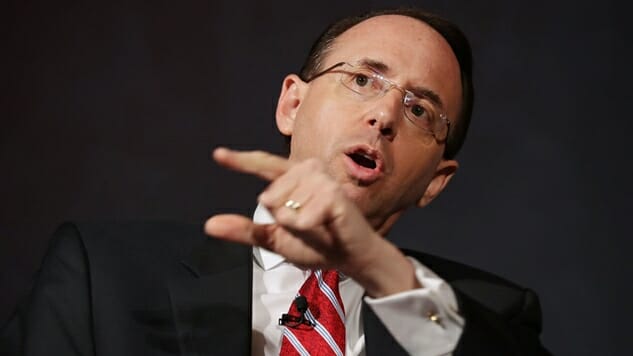Rod Rosenstein: What We Know Amid the Confusion
Photo by Chip Somodevilla/Getty Politics Features Russia Investigation
On Friday, the New York Times released a bombshell report that didn’t really live up to the explosive title of “Rod Rosenstein Suggested Secretly Recording Trump and Discussed 25th Amendment.” Per the NYT:
The deputy attorney general, Rod J. Rosenstein, suggested last year that he secretly record President Trump in the White House to expose the chaos consuming the administration, and he discussed recruiting cabinet members to invoke the 25th Amendment to remove Mr. Trump from office for being unfit.
Mr. Rosenstein made these suggestions in the spring of 2017 when Mr. Trump’s firing of James B. Comey as F.B.I. director plunged the White House into turmoil. Over the ensuing days, the president divulged classified intelligence to Russians in the Oval Office, and revelations emerged that Mr. Trump had asked Mr. Comey to pledge loyalty and end an investigation into a senior aide.
Mr. Rosenstein was just two weeks into his job. He had begun overseeing the Russia investigation and played a key role in the president’s dismissal of Mr. Comey by writing a memo critical of his handling of the Hillary Clinton email investigation. But Mr. Rosenstein was caught off guard when Mr. Trump cited the memo in the firing, and he began telling people that he feared he had been used.
The reason I mildly criticize the Times is that there is no sourcing in the first three paragraphs of the story, and the overall picture doesn’t become completely clear as to how serious Rosenstein took these things he reportedly said. The report cites “Several people [who] described the episodes in interviews over the past several months,” and they learned of this news thanks to being “briefed either on the events themselves or on memos written by F.B.I. officials, including Andrew G. McCabe, then the acting bureau director, that documented Mr. Rosenstein’s actions and comments.” We don’t have a whole lot to go off of in this report as to who is leaking it, and because the article reads as a legitimate coup attempt by the second ranking man in the Department of Justice, you can’t help but wonder if those “several” officials are in the Trump camp, trying to lay the groundwork for what is happening as I write this.
As I prep this story, we still do not know whether Deputy Attorney General Rod Rosenstein stepped down or was fired. Axios seems to have the most complete picture, as they reported that Rosenstein has “verbally resigned to Chief of Staff John Kelly in anticipation of being fired by President Trump, according to a source with direct knowledge,” and “per a second source with direct knowledge: “He’s expecting to be fired,” so he plans to step down.” However, outlets like the AP and CNN are simply reporting that “Rod Rosenstein expects to be fired Monday.” Pete Williams of NBC is reporting that it’s “theoretically possible that when this meeting’s over Rod Rosenstein goes back to being deputy attorney general.” Rosenstein is on his way to the White House right now, so we’ll update this post once he’s met with Dear Leader.
The natural question here is: what is going to happen to the Mueller investigation? Former FBI Director Andrew McCabe released a statement saying he is concerned about it being “at risk.” Someone in the Department of Justice would replace Rosenstein’s stewardship of it, and because Trump still has not appointed an associate attorney general after Rachel Brand left the #3 post in the DOJ in February, the task would fall to Solicitor General Noel Francisco. However, he may need to recuse like Jeff Sessions did, because Francisco left Jones Day recently—a firm who represents the Trump campaign. If Francisco recuses, the Assistant Attorney General for the Office of Legal Counsel, Steven Engel—who has no prosecutorial experience—would take over the investigation.
Whatever happens, be rest assured that Robert Mueller has prepared for this inevitability. Take Paul Manafort for example. He admitted to crimes that are also state crimes, so if Trump were to pardon him, a state could turn around and charge Manafort with crimes that are outside Trump’s reach. Plus, legal experts say that Trump would need to word the pardon so broadly that it encompasses crimes Manafort wasn’t charged with. Not to mention, the FBI still exists, and the information that has been brought to light cannot just be shoved back into the dark. If Trump sticks a lackey in the DOJ to obstruct the investigation, they can do a lot in the way of not signing off on searches, interviews, etc…but the Russia investigation has proven itself to be far too large to be put back into the closet, no matter who the Deputy Attorney General is.
Jacob Weindling is a staff writer for Paste politics. Follow him on Twitter at @Jakeweindling.